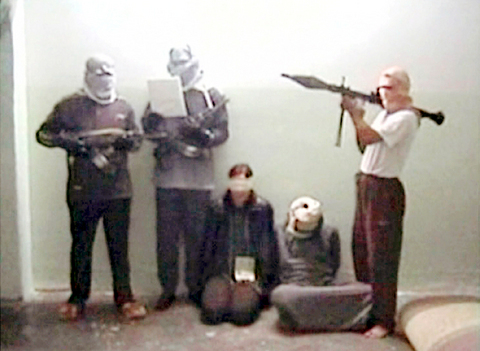A peace group blamed the US and Britain yesterday for the abduction of four activists shown in an insurgent video, saying the kidnapping was the direct result of the occupation of Iraq.
Meanwhile, in the central town of Baquba, unidentified gunmen opened fire on a minibus early yesterday, killing nine construction workers and wounding two others, the Diyala police said in a statement.
After a hiatus in the kidnapping of foreigners, TV footage on Tuesday once again showed Westerners held captive: a German archaeologist -- bound and blindfolded -- knelt among masked gunmen in one video and four frightened peace activists were shown in another blurry tape.

PHOTO: AP
The latest attacks are part of a new wave of kidnappings police fear is aimed at disrupting next month's national elections.
Christian Peacemaker Teams, a group that has had activists in Iraq since October 2002, said it was saddened by the video tape of their workers, who the statement said were working against the occupation of Iraq.
"We are angry because what has happened to our teammates is the result of the actions of the US and UK governments due to the illegal attack on Iraq and the continuing occupation and oppression of its people," the group said.
The group listed the names of those abducted as Tom Fox, an American; Norman Kember, from Britain; and James Loney and Harmeet Singh Sooden, 32, both of Canada.
"We are some of the few internationals left in Iraq who are telling the truth about what is happening to the Iraqi people," the statement said.
"We hope that we can continue to do this work and we pray for the speedy release of our beloved teammates," it added.
On Tuesday, al-Jazeera broadcast video of the four men held by a previously unknown group calling itself the Swords of Righteousness Brigade.
The group claimed they were spies working under the cover of Christian peace activists.
Loney, a community worker, was leading the Christian group's delegation in Iraq.
The tape was shown the same day a TV station displayed a photo of the German hostage, Susanne Osthoff.
The kidnappers threatened to kill Osthoff and her Iraqi driver unless Germany halts all contacts with the Iraqi government.
Osthoff and her driver were kidnapped on Friday.
Germany has ruled out sending troops to Iraq and opposed the US-led war, but has been training Iraqi police and military outside the country.
Iraq was swept by a wave of kidnappings and beheadings of foreigners last year and early this year, but such attacks have dropped off in recent months as many Western groups have left and security precautions for those who remain have tightened.
Insurgents, including al-Qaeda in Iraq, have seized more than 225 people, killing at least 38.

Auschwitz survivor Eva Schloss, the stepsister of teenage diarist Anne Frank and a tireless educator about the horrors of the Holocaust, has died. She was 96. The Anne Frank Trust UK, of which Schloss was honorary president, said she died on Saturday in London, where she lived. Britain’s King Charles III said he was “privileged and proud” to have known Schloss, who cofounded the charitable trust to help young people challenge prejudice. “The horrors that she endured as a young woman are impossible to comprehend and yet she devoted the rest of her life to overcoming hatred and prejudice, promoting kindness, courage, understanding

US President Donald Trump on Friday said Washington was “locked and loaded” to respond if Iran killed protesters, prompting Tehran to warn that intervention would destabilize the region. Protesters and security forces on Thursday clashed in several Iranian cities, with six people reported killed, the first deaths since the unrest escalated. Shopkeepers in Tehran on Sunday last week went on strike over high prices and economic stagnation, actions that have since spread into a protest movement that has swept into other parts of the country. If Iran “violently kills peaceful protesters, which is their custom, the United States of America will come to

‘DISRESPECTFUL’: Katie Miller, the wife of Trump’s most influential adviser, drew ire by posting an image of Greenland in the colors of the US flag, captioning it ‘SOON’ US President Donald Trump on Sunday doubled down on his claim that Greenland should become part of the US, despite calls by the Danish prime minister to stop “threatening” the territory. Washington’s military intervention in Venezuela has reignited fears for Greenland, which Trump has repeatedly said he wants to annex, given its strategic location in the arctic. While aboard Air Force One en route to Washington, Trump reiterated the goal. “We need Greenland from the standpoint of national security, and Denmark is not going to be able to do it,” he said in response to a reporter’s question. “We’ll worry about Greenland in

PERILOUS JOURNEY: Over just a matter of days last month, about 1,600 Afghans who were at risk of perishing due to the cold weather were rescued in the mountains Habibullah set off from his home in western Afghanistan determined to find work in Iran, only for the 15-year-old to freeze to death while walking across the mountainous frontier. “He was forced to go, to bring food for the family,” his mother, Mah Jan, said at her mud home in Ghunjan village. “We have no food to eat, we have no clothes to wear. The house in which I live has no electricity, no water. I have no proper window, nothing to burn for heating,” she added, clutching a photograph of her son. Habibullah was one of at least 18 migrants who died